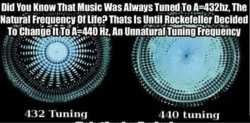>>15228875No, it's bullshit. 432 is an interesting number with many beautiful numerological properties, but 432hz is a numerological cargo cult that has got popular because most musicians are not deep thinkers about anything outside of music. Tuning to 432hz makes things sound slightly flat and many people think that sounds better in a blind test because most people slightly prefer bass to treble.
432hz is just 432 cycles per second, and there is nothing fundamentally important about the second as a measure of time, it's just what we are used to from clocks. Nobody obsesses over how the day is divided in 24 hourly cycles of 60 minutes and each minute into 60 seconds thereby proving the inherent superiority of the Babylonian base-60 numerical system. In fact most people who go on about 432hz couldn't tell you what base 60 is or who the Babylonians were.
The day could just as easily be divided in 20 hours of 20 minutes of 20 seconds of 20 instants (this would give an 'instant' that is about half of a conventional second, and 'seconds' that were about 10 conventional seconds long). Guess what, music would still sound the same even if you used an entirely different clock. The tunings would be different (because you would be measuring the period of a wave against a different time interval) but the tuning ratios between the different notes would be the same. Tuning ratios are what matters and what you respond to in music, and they do have mystical significance, because they are fundamental quantities in the same way that basic shapes yield the fundamentals of geometry like the square root of 2 or pi.
If you are interested in this ditch equal temperament and explore 'just intonation' which uses pure musical intervals instead of the slightly fudged ones of western harmony, which are designed to let composers spice up boring tunes by changing keys. Just intonation is what barbershop quartets use and why they sound so 'in tune.'
tl;dr 432hz tuning is a meme.

